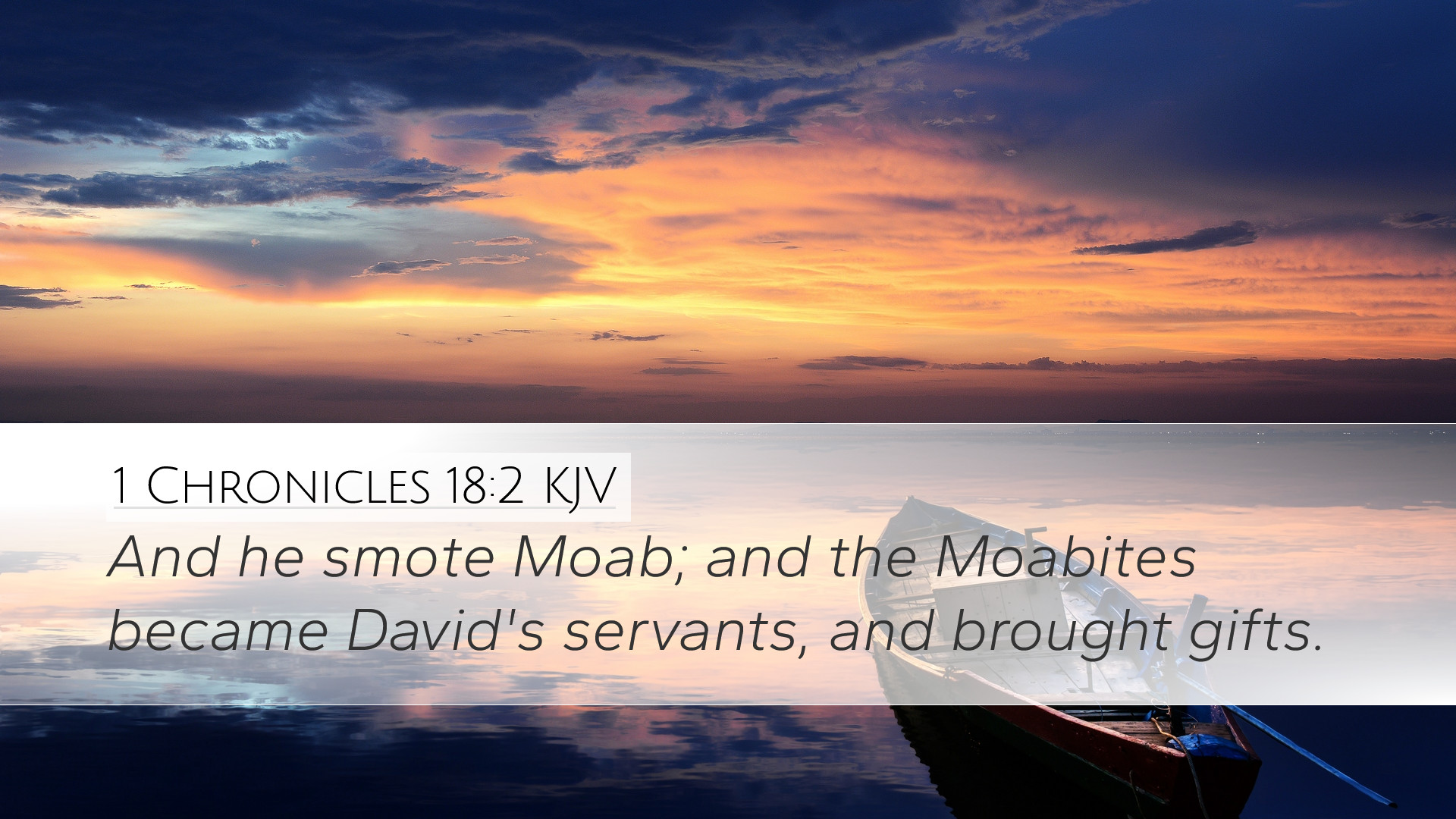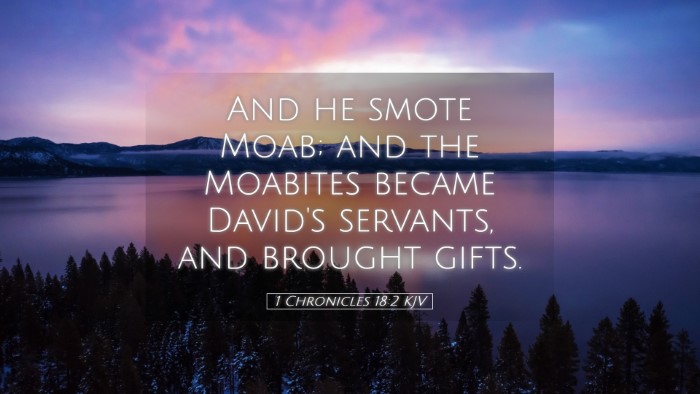Commentary on 1 Chronicles 18:2
Verse: "And he smote Moab; and the Moabites became David's servants, and brought gifts."
Introduction
The verse highlights a significant military victory by King David over Moab, illustrating both the warlike nature of his reign and the importance of Moab's subjugation in the context of ancient Israelite history. This commentary compiles insights from several public domain commentaries to provide a thorough analysis of the implications of this verse for pastors, students, theologians, and Bible scholars.
Historical Context
The conflict with Moab is rooted in Israel's relationship with its neighboring nations. Moab, situated east of the Jordan River, had a history of hostility towards Israel, influenced by both cultural and territorial conflicts. David’s victory over Moab is not merely a military success, but it signifies the geopolitical landscape of the ancient Near East.
Insights from Matthew Henry
Matthew Henry emphasizes that David's victories are emblematic of God's favor and blessing on him. According to Henry, this conquest over Moab serves as a reminder of God's power in uplifting one nation while bringing another to subjugation:
- Divine Providence: Henry points out that God’s providential hand is evident in David's successes, showing that the results of wars are influenced by divine will.
- Servitude and Tribute: The Moabites becoming David's servants marks a shift in power dynamics, leading to a flow of tribute, which illustrates the subjugation process common in ancient warfare.
Insights from Albert Barnes
Albert Barnes provides a detailed analysis of the implications of David's defeat of Moab. He notes the following points:
- Nature of Conflict: Barnes suggests that the victory over Moab was a fulfillment of previous sojournings in the land that Moses had foretold. It expresses a justice that comes from avenging Israel's past assaults.
- Symbolism in Tribute: The act of bringing gifts signifies acknowledgment of David's authority and serves as a precursor to further relationships formed under David's reign. It also symbolizes the power dynamics in ancient tribal societies where tribute was often a sign of submission.
Insights from Adam Clarke
Adam Clarke’s commentary often explores the nuances of language and cultural practices. In his analysis, he provides the following observations:
- Military Tactics: Clarke remarks on the military strategy employed by David against Moab and how it reflects both his tactical prowess and the effectiveness of Israel's army during this period.
- Cultural Significance: He discusses the cultural implications of subjugation, emphasizing that while the Moabites became servants, this was a common practice to ensure stability and protect trade routes, benefiting both parties in a way that was customary in those times.
Theological Reflections
From a theological standpoint, the events depicted in 1 Chronicles 18:2 raise important questions about divine sovereignty, human agency, and the nature of conflict:
- Divine Sovereignty: The conquest of Moab illustrates how God can use human leadership—like David's—to fulfill divine purposes in history.
- Ethics of Warfare: The passage challenges modern theological perspectives on warfare, prompting reflections on how believers are to view conflict and the morality surrounding military actions today.
- Servanthood and Power: The transition of the Moabites from enemies to servants invokes discussion on the nature of power and servanthood, especially in biblical contexts where servitude can also relate to honor and allegiance.
Applications for Today
For contemporary believers and leaders in the church, this verse conveys several key applications:
- Understanding Conflict: Be encouraged that God is sovereign even amidst human conflict, and trust that He can bring about good outcomes through difficult situations.
- Ministry of Servanthood: Embrace a lifestyle of servanthood as modeled in biblical texts, recognizing that true leadership in the Kingdom of God often involves service.
- Tribute and Recognition: Consider the significance of recognizing God’s hand in our victories, and ensure that we give Him credit for the blessings and successes in our lives and ministries.
Conclusion
1 Chronicles 18:2, while seemingly a straightforward historical account, invites deep reflection on themes of warfare, divine providence, and the ethical dimensions of power and servitude. The insights from historical commentaries further illuminate the text, offering rich material for teaching, preaching, and scholarly study. As we study this verse, may we be inspired to see God’s hand at work in our lives and the world around us.


